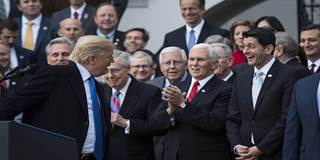Last December, Republicans relied on the support of conservative economists who predicted that the party's corporate tax cuts would boost productivity and investment in the United States substantially. The forecasts were wrong, and the silence of those who made them suggests that they knew it all along.
BERKELEY – It has now been one year since US President Donald Trump and his fellow Republicans rammed their massive corporate tax cut through Congress. At the time, critics of the “Tax Cuts and Jobs Act” described it as a cynical handout for wealthy shareholders. But a substantial number of economists came out in support of it.
For example, one prominent group, most of whom served in previous Republican administrations, predicted in The Wall Street Journal that the tax cuts would boost long-run GDP by 3-4%, with an “associated increase” of about 0.4% “in the annual rate of GDP growth” over the next decade. And in an open letter to Congress, a coterie of over 100 economists asserted that “the macroeconomic feedback generated by the [tax cuts]” would be “more than enough to compensate for the static revenue loss,” implying that the bill would be deficit-neutral over time.
Likewise, in a commentary for Project Syndicate, Robert J. Barro of Harvard University argued that the tax cuts would increase long-run real (inflation-adjusted) per capita GDP by an improbable 7%. And Michael J. Boskin of the Hoover Institution endorsed his analysis in a follow-up commentary.

BERKELEY – It has now been one year since US President Donald Trump and his fellow Republicans rammed their massive corporate tax cut through Congress. At the time, critics of the “Tax Cuts and Jobs Act” described it as a cynical handout for wealthy shareholders. But a substantial number of economists came out in support of it.
For example, one prominent group, most of whom served in previous Republican administrations, predicted in The Wall Street Journal that the tax cuts would boost long-run GDP by 3-4%, with an “associated increase” of about 0.4% “in the annual rate of GDP growth” over the next decade. And in an open letter to Congress, a coterie of over 100 economists asserted that “the macroeconomic feedback generated by the [tax cuts]” would be “more than enough to compensate for the static revenue loss,” implying that the bill would be deficit-neutral over time.
Likewise, in a commentary for Project Syndicate, Robert J. Barro of Harvard University argued that the tax cuts would increase long-run real (inflation-adjusted) per capita GDP by an improbable 7%. And Michael J. Boskin of the Hoover Institution endorsed his analysis in a follow-up commentary.